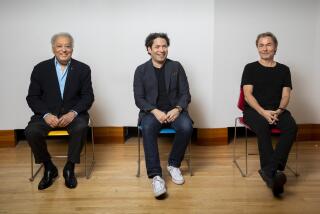Their period music could use an exclamation point
- Share via
You can hardly blame the beleaguered Getty Center for playing it safe these days. So now that it’s got its antiquities carefully secured in its manicured Getty Villa (unless the Italian courts decide differently), the center offered some musical antiquities tamely displayed for the first public concert in the renovated villa’s new 250-seat auditorium Saturday night.
The ensemble was Tafelmusik from Toronto. The program was called “Metamorphosis: From Myth to Music.” An excellent Canadian actor, R.H. Thomson, was a lively Ovid, recounting mythical tales of Castor and Pollux, Acis and Galatea, Echo, Pygmalion, Pan and Apollo and Alcyone. Tafelmusik supplied relevant musical examples from the French, Italian and British Baroque.
Children, I think, might have enjoyed the animated storytelling. But I’m glad none were present. There are far more vibrant period instrument ensembles these days than the untrendy Tafelmusik.
Tafelmusik is, in a way, itself an antique. It was founded in 1979 and has been led since 1981 by violinist Jeanne Lamon. It has made scores of recordings and many of them have, over the years, lived up to the group’s name, which translates as Table Music. Namely, the best that can be said about too many Tafelmusik CDs is that they provide perfect inoffensive Baroque background brunch music.
This is not an incapable ensemble, even if it doesn’t exhibit the sizzling virtuosity of the hot, adventurous early music groups out of Italy, Germany, France and Holland. But under Lamon, a kind of sameness -- of style, of phrasing -- made much of Saturday’s program feel plodding and unexceptional.
Little bits of color-laden Rameau, poised Lully, heart-rending Marin Marais and lovely, placid Purcell all seemed to come out of the same blender. Strings whined and struggled with intonation. The two oboes and bumptious bassoon were somewhat pungent at best.
The auditorium looks, to some degree, like a smaller version of the 450-seat auditorium at the Getty Center in Brentwood. The sound from the third row (which isn’t really up close -- it’s a large room for so few seats) was clinically clean and did a fine job of handling both unamplified speaking and music. The acoustics did -- at least from the front -- lack a certain bloom, however.
More bloom, or warmth, would surely have helped Tafelmusik, but the clarity did allow each of the 17 players to be easily distinguished. The vitality in this ensemble clearly lies in its fresher blood, especially in the feisty young violinists in the back rows.
The climax of the program was the contest between the pipe-playing Pan and Apollo, music’s god. Pan was represented by a bland oboe concerto from a minor Italian composer, Allesandro Marcello, whom Bach admired. The plangent adagio opening was turned into a lament, the presto meant to be the fight. The soloist, John Abberger, laments more confidently than he fights.
Apollo’s turn was taken through the “Summer” Concerto from Vivaldi’s “Four Seasons.” Christopher Verrette was the soloist. Even though he got carried away with embellishing the slow movement, he is not a showy player. His tone is thin and intonation iffy. No Baroque music is more overexposed than this, and featureless playing of it simply won’t do anymore. Mythology was not served. Apollo lost, although not by much.
Perhaps one shouldn’t be too hard on Tafelmusik and its conventionality. A recording, released last year, of Beethoven’s Fifth and Sixth Symphonies is respectably played. But early music performance is rapidly changing, getting more spirited and less orthodox by the minute. It may sound oxymoronic to say this about an ensemble devoted to the historical presentation of ancient music, but unless Tafelmusik can change with the times it will soon become obsolete.
More to Read
The biggest entertainment stories
Get our big stories about Hollywood, film, television, music, arts, culture and more right in your inbox as soon as they publish.
You may occasionally receive promotional content from the Los Angeles Times.











